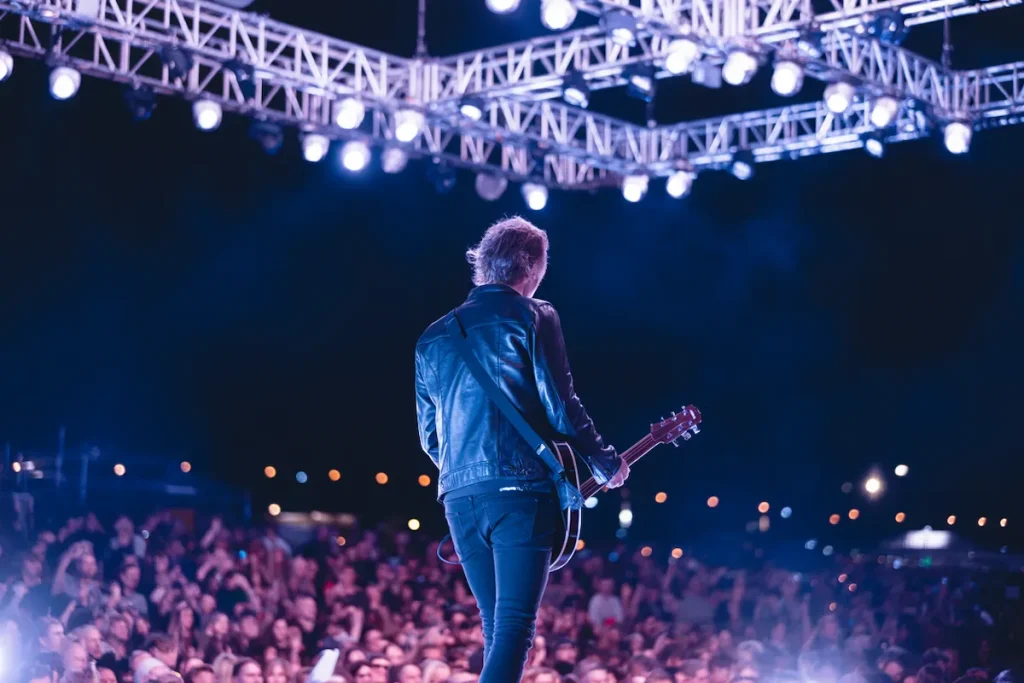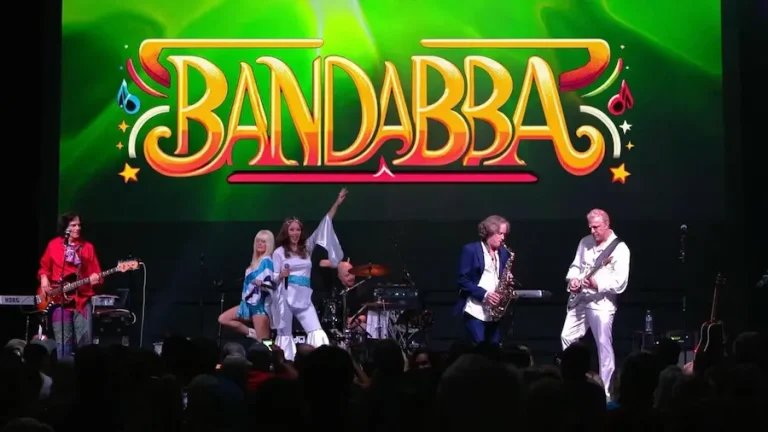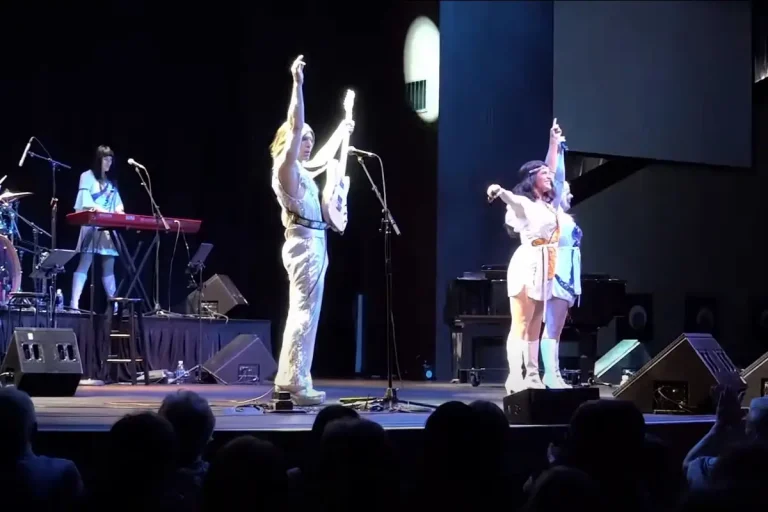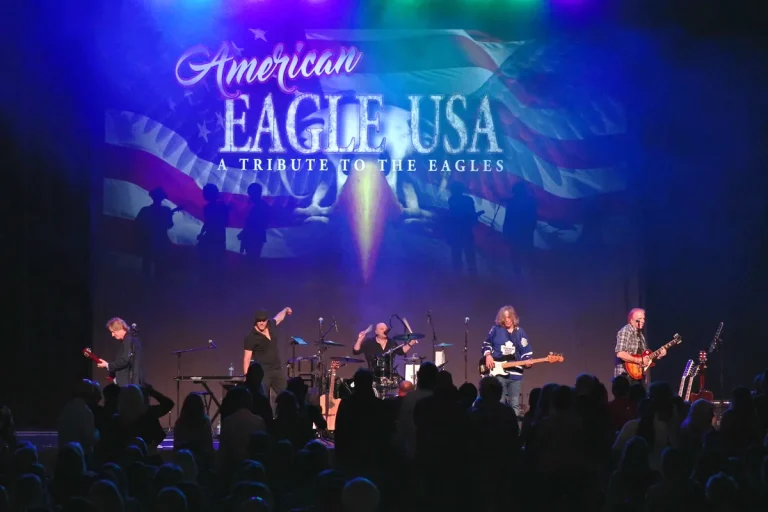Many original musicians dismiss tribute bands as glorified karaoke acts. But they’re missing one of music’s best-kept career secrets.
While some musicians dream of the “Rock Star” movie scenario—joining the actual band they tribute—the real value lies elsewhere. Tribute bands serve as comprehensive career accelerators for original artists, offering skill mastery, industry connections, financial stability, and performance experience that dramatically shortens the path to original music success.
The Four Career Development Pillars
Musical Skill Mastery
Learning to recreate complex arrangements forces musicians beyond their comfort zones authentically. When you’re covering Led Zeppelin’s “Kashmir” or Rush’s “YYZ,” mediocrity isn’t an option. Tribute work demands technical precision while developing your musical vocabulary across genres you might never have explored.
The performance standards are unforgiving. Tribute audiences know every note, every vocal inflection, every guitar tone. This pressure creates musicians who can deliver professional-quality performances consistently—a skill that translates directly to original work.
Industry Experience and Networking
Good tribute bands get booked. While original acts struggle to find venues willing to take risks on unknown material, tribute bands offer guaranteed crowd appeal. This creates immediate access to venue owners, promoters, and sound engineers who form the backbone of the live music industry.
These relationships can compound quickly. A venue owner who books your Journey tribute might also manage original music nights or know A&R scouts. In fact, the national act that I joined told me they called the clubs I had performed at to see if I was a junkie or jerk. Fortunately, those club owners had good experiences with me, otherwise, that opportunity might have been DOA.
Other professional musicians in the tribute scene can also become collaborators, bandmates, or recommendation sources for original projects. Who’s to say they aren’t working on their own original music too?
Financial Stability for Artistic Development
This is the biggie to me. Here’s the brutal math: most original music doesn’t pay bills. Tribute band musicians regularly earn $500 to $1500 per show, while original acts might play for bar tabs and “exposure.” This income difference isn’t just about survival—it’s about creative freedom. I certainly used money from my cover band work to invest in my album creation.
Steady tribute income means investing in quality recording equipment, professional mixing, marketing campaigns, or simply having the mental bandwidth to focus on songwriting instead of rent money.
Financial pressure kills artistic creativity faster than any other factor in music careers.
There’s one other thing I’ve observed as both a tribute musician and a musician in a national act: buyers and support staff typically treat you very well. Your backstage gnoshing list is taken care of, as is your dressing room, catering and hotel rooms. The less the buyer is willing to spend, the worse the accommodations, and vice-versa! This is why your typical “cover bands” get treated like crap and paid even less.
Performance Confidence and Audience Building
Nothing builds stage presence like regular gigging. Tribute bands might play 50+ shows annually while original acts struggle to book monthly gigs. This volume of performance experience develops intuitive audience reading, crowd interaction skills, and the confidence that separates amateur from professional performers.
Smart tribute musicians cross-pollinate audiences. Journey fans who love your tribute performance might stick around for original material, especially if you’ve proven you can deliver quality entertainment.
One other thing that certainly helped me when I joined BOSTON was that my tribute bands had performed on some really large stages; they didn’t faze me anymore. In addition, we’d opened for some major acts as well, and I was comfortable around artists and crews from national acts.
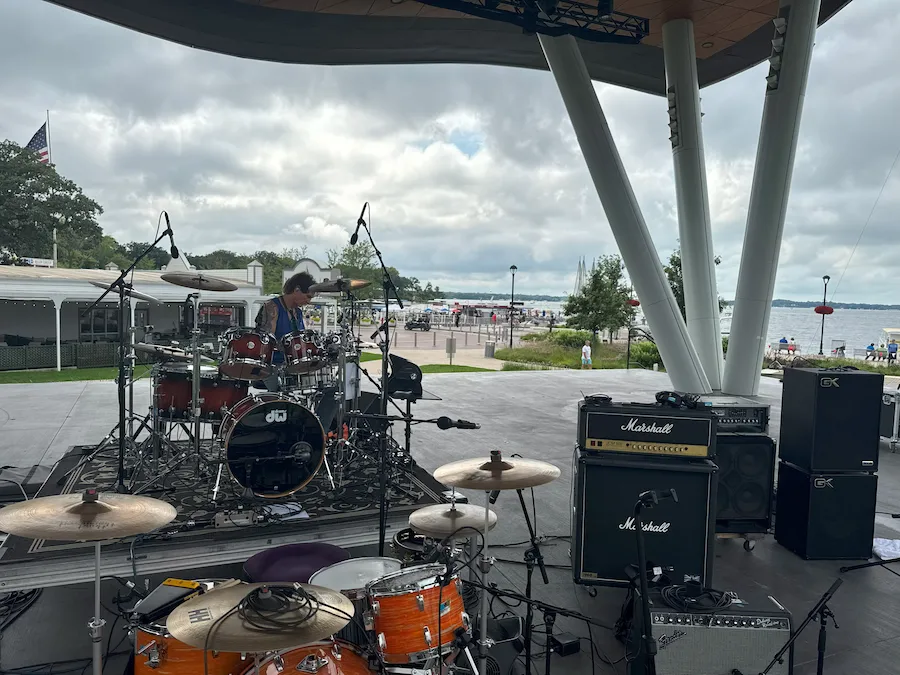
Contemporary Success Stories
Charles Bradley
Charles spent years performing as “Black Velvet,” a James Brown tribute act in New York. The disciplined study of Brown’s vocal techniques, stage movements, and emotional delivery didn’t just make him a better tribute performer—it shaped him into one of soul music’s most authentic voices when Daptone Records discovered him through his tribute work in the 2000s.
His three acclaimed original albums built directly on the foundation of skills developed through tribute performances. Bradley often said the tribute work taught him how to channel raw emotion into controlled artistic expression.
Steel Panther
Steel Panther evolved from “Metal Skool,” a covers band that performed classic rock hits with comedy elements. The tribute foundation provided them with encyclopedic knowledge of metal’s greatest songs, performance techniques, and crowd interaction strategies. When they shifted to original comedy metal, they possessed both technical mastery and deep genre understanding.
Their original albums have charted internationally, but more importantly, they developed a sustainable career model combining tribute skills with original creativity.
Panic! At The Disco
Panic! At The Disco started as a Blink-182 cover band in Las Vegas. The tribute experience taught them pop-punk songwriting structures, performance energy, and audience engagement techniques. When they transitioned to original emo-influenced material, they already possessed the musical foundation and stage confidence needed for immediate success.
The band chemistry developed through tribute performances carried directly into their original work, contributing to their breakthrough album “A Fever You Can’t Sweat Out.”
The Rare “Joining the Band” Stories
These make headlines precisely because they’re exceptional. David Victor performed in the BOSTON tribute band “SMOKIN'” for years before being discovered through YouTube and joining the actual band from 2012-2014. His tribute experience prepared him for the technical demands and pressure of performing classic rock at arena level.
Tim “Ripper” Owens fronted the Judas Priest tribute “British Steel” before a videotape reached the actual band, leading to his recruitment when Rob Halford initially left. Arnel Pineda performed Journey covers with Filipino band “The Zoo” before Neal Schon discovered him on YouTube and invited him to become Journey’s lead vocalist.
These stories inspire, but they shouldn’t be the primary motivation for tribute work. The real value lies in career development for your original music.

Classic Foundation Examples
Even legendary original artists started with covers. The Rolling Stones spent their early years as a blues cover band, studying American masters like Muddy Waters and Chuck Berry. This foundation informed their original sound and taught them how to channel influences into authentic expression.
Nirvana’s Kurt Cobain and Krist Novoselic performed in “The Sellouts,” believe it or not, a Creedence Clearwater Revival tribute, before forming their grunge-defining band. 5 Seconds of Summer built their initial audience through acoustic YouTube covers before transitioning to original pop-punk material.
The pattern repeats across genres: study the masters through tribute work, then apply those lessons to original creativity.
Strategic Implementation
Choose tribute focus strategically. If you’re developing indie rock material, covering Radiohead or Arctic Monkeys might provide more relevant experience than performing classic rock covers. Consider both local market demand and personal artistic development goals.
Maintain professional standards. Quality tribute work requires authentic representation of the original artists. This means proper equipment, accurate arrangements, and respectful performance attitudes. Cutting corners undermines both the tribute experience and your professional reputation.
Plan your transition timeline. Use tribute gigs to test original material with established audiences. Graduate original songs into set lists gradually, leveraging the goodwill built through quality tribute performances.
Avoid treating tribute work as a temporary inconvenience. The skills, relationships, and experience gained through professional tribute performance create lasting career advantages regardless of when you transition to original focus.
Industry Reality Check
Venue owners book tribute acts because they reduce risk. Unknown original bands might draw nobody; established tribute acts guarantee baseline attendance. This creates opportunities for original artists to prove their professional capabilities while building industry relationships.
Music industry professionals recognize tribute experience as legitimate skill development. The technical proficiency, stage presence, and audience engagement abilities developed through quality tribute work translate directly to original music performance and recording situations.
The financial mathematics support strategic tribute involvement. Emerging original artists typically earn inconsistent, minimal income while building audiences. Tribute performers with professional presentation can generate steady income streams that fund original music development, equipment purchases, and creative freedom.
Future Opportunities
Technology expands tribute band possibilities. Social media platforms enable tribute acts to build international audiences, while streaming services create new revenue streams. Corporate events and private parties increasingly book tribute acts, expanding market opportunities beyond traditional venues.
Virtual performance capabilities developed during recent years create additional income sources and audience development opportunities for tribute performers willing to embrace technological tools.
Your Strategic Next Steps
Tribute bands aren’t career detours—they’re career accelerators for original artists willing to approach them professionally. The skills, connections, income, and experience gained through quality tribute work create sustainable foundations for original music success.
The choice isn’t between tribute work and original music. It’s between struggling alone as an unknown original act or building career momentum through proven tributary strategies.
Research local tribute opportunities that align with your musical goals. Connect with other professional musicians seeking serious tribute projects. Invest in quality equipment and authentic representations of the artists you choose to honor.
Most importantly, treat tribute work as legitimate musical education and career development. The artists you’re covering spent decades perfecting their craft—study them seriously, and apply those lessons to your original musical journey.
Your original music career might start with someone else’s songs. That’s not compromise—it’s strategy.



